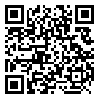مجله رویش روانشناسی از دادن گواهیهای کاغذی معذور است. لطفا تقاضا نکنید. همه گواهی ها در صفحه شخصی کاربران موجود است.
year 10, Issue 3 (Spring 2021 2021)
Rooyesh 2021, 10(3): 111-120 |
Back to browse issues page
Download citation:
BibTeX | RIS | EndNote | Medlars | ProCite | Reference Manager | RefWorks
Send citation to:



BibTeX | RIS | EndNote | Medlars | ProCite | Reference Manager | RefWorks
Send citation to:
Mardani M, Hamid N. (2021). Investigating the mediating role of rumination in the relationship between insecure attachment styles and depression in outpatient psychiatric disorders. Rooyesh. 10(3), 111-120.
URL: http://frooyesh.ir/article-1-2540-en.html
URL: http://frooyesh.ir/article-1-2540-en.html
1- M.A. in Clinical Psychology, Faculty of Education and Psychology, Shahid Chamran University of Ahvaz, Ahvaz, Iran. , doctormaryam20@gmail.com
2- Associate Professor, Department of Psychology, Faculty of Education and Psychology, Shahid Chamran University of Ahvaz, Ahvaz, Iran.
2- Associate Professor, Department of Psychology, Faculty of Education and Psychology, Shahid Chamran University of Ahvaz, Ahvaz, Iran.
Abstract: (3518 Views)
Rumination, as a maladaptive cognitive strategy, is effective in various disorders such as depression. The aim of this study was to investigate the effect of rumination as a mediator in the relationship between anxious and avoidant insecure attachment with depression. In the study, 120 people with depressive disorders, obsessive-compulsive disorder, and anxiety were selected Purposefully from Mehr Hospital. The respondents answered the Rumination Response Scale (Nolen-Hoeksema, & Morrow, 1991), Beck Depression Inventory (Beck et al., 1961), and the Experiences in Close Relationship Questionnaire (Brennan et al., 1998). Data analysis was performed using structural equation modeling. The results showed that rumination significantly mediated the relationship between anxious attachment and depression. In this study, the relationship between rumination and avoidant attachment was not confirmed. Based on the results of the study, anxious attachment style can play a role in the formation of depression by affecting the amount of rumination.
Type of Article: Research |
Subject:
Clinical Psychology
Received: 2021/01/3 | Accepted: 2021/01/21 | ePublished: 2021/05/31
Received: 2021/01/3 | Accepted: 2021/01/21 | ePublished: 2021/05/31
Send email to the article author
| Rights and permissions | |
 |
This work is licensed under a Creative Commons Attribution-NonCommercial 4.0 International License. |






